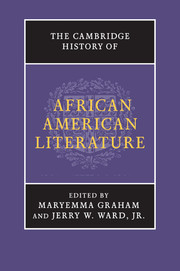Book contents
- Frontmatter
- Introduction
- PART I AFRICAN AMERICAN LITERATURE FROM ITS ORIGINS TO THE TWENTIETH CENTURY
- 1 Sounds of a tradition: the souls of black folk
- 2 Early print literature of Africans in America
- 3 The emergence of an African American literary canon, 1760–1820
- 4 Dividing a nation, uniting a people: African American literature and the abolitionist movement
- 5 African American literature and the abolitionist movement, 1845 to the Civil War
- 6 Writing freedom: race, religion, and revolution, 1820–1840
- 7 “We wish to Plead our own Cause”: independent antebellum African American literature, 1840–1865
- 8 Racial ideologies in theory and practice: political and cultural nationalism, 1865–1910
- 9 The “fictions” of race
- 10 “We Wear the Mask”: the making of a poet
- 11 Toward a modernist poetics
- PART II AFRICAN AMERICAN LITERATURE IN THE TWENTIETH CENTURY
- PART III AFRICAN AMERICAN LITERATURE AS ACADEMIC AND CULTURAL CAPITAL
- Bibliography
- Index
- References
4 - Dividing a nation, uniting a people: African American literature and the abolitionist movement
from PART I - AFRICAN AMERICAN LITERATURE FROM ITS ORIGINS TO THE TWENTIETH CENTURY
Published online by Cambridge University Press: 28 May 2011
- Frontmatter
- Introduction
- PART I AFRICAN AMERICAN LITERATURE FROM ITS ORIGINS TO THE TWENTIETH CENTURY
- 1 Sounds of a tradition: the souls of black folk
- 2 Early print literature of Africans in America
- 3 The emergence of an African American literary canon, 1760–1820
- 4 Dividing a nation, uniting a people: African American literature and the abolitionist movement
- 5 African American literature and the abolitionist movement, 1845 to the Civil War
- 6 Writing freedom: race, religion, and revolution, 1820–1840
- 7 “We wish to Plead our own Cause”: independent antebellum African American literature, 1840–1865
- 8 Racial ideologies in theory and practice: political and cultural nationalism, 1865–1910
- 9 The “fictions” of race
- 10 “We Wear the Mask”: the making of a poet
- 11 Toward a modernist poetics
- PART II AFRICAN AMERICAN LITERATURE IN THE TWENTIETH CENTURY
- PART III AFRICAN AMERICAN LITERATURE AS ACADEMIC AND CULTURAL CAPITAL
- Bibliography
- Index
- References
Summary
The 1820s signal a decisive turn in the development of African American literature. The vocabularies of collective black resistance and reform – acting as a familiar refrain in much of what may be considered as African American creative and political expression for the better part of the nineteenth century – take center stage during this period. As a poof fact, early nineteenth-century black American writers were not the first to stress issues of emancipation, equality, and racial unity. These themes may be found in African American/Atlantic writing as early as the 1780s. The nineteenth-century black writers of this period are, then, in an important sense heirs to a much older tradition in rhetoric. Yet, early nineteenth-century black writers were founding figures in a critical era in political and cultural transformation. They would employ the themes of black resistance and reform as a way to imagine a more robust (and less fragmented) African American identity; as a way to coax antislavery resistance toward more radical postures; and as a way to expose the racist underbelly of an American democratic project beholden to slaveholding influence. This in turn set the ideological and discursive framework for black writing to transition toward a literature occupied primarily with the black experience in the United States. The former slave narrator and celebrated abolitionist Frederick Douglass drew both moral and political inspiration from this crucial stage in written expression, penning some of the most piercing insights into the legacies of slaveholding brutality to have been produced by an African American author in the nineteenth century.
- Type
- Chapter
- Information
- The Cambridge History of African American Literature , pp. 66 - 90Publisher: Cambridge University PressPrint publication year: 2011

